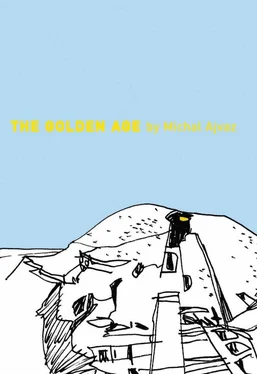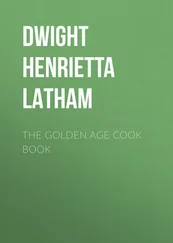Michal Ajvaz - The Golden Age
Здесь есть возможность читать онлайн «Michal Ajvaz - The Golden Age» весь текст электронной книги совершенно бесплатно (целиком полную версию без сокращений). В некоторых случаях можно слушать аудио, скачать через торрент в формате fb2 и присутствует краткое содержание. Год выпуска: 2010, Издательство: Dalkey Archive Press, Жанр: Современная проза, на английском языке. Описание произведения, (предисловие) а так же отзывы посетителей доступны на портале библиотеки ЛибКат.
- Название:The Golden Age
- Автор:
- Издательство:Dalkey Archive Press
- Жанр:
- Год:2010
- ISBN:нет данных
- Рейтинг книги:4 / 5. Голосов: 1
-
Избранное:Добавить в избранное
- Отзывы:
-
Ваша оценка:
- 80
- 1
- 2
- 3
- 4
- 5
The Golden Age: краткое содержание, описание и аннотация
Предлагаем к чтению аннотацию, описание, краткое содержание или предисловие (зависит от того, что написал сам автор книги «The Golden Age»). Если вы не нашли необходимую информацию о книге — напишите в комментариях, мы постараемся отыскать её.
is Michal Ajvaz’s greatest and most ambitious work.
The Golden Age
The Golden Age — читать онлайн бесплатно полную книгу (весь текст) целиком
Ниже представлен текст книги, разбитый по страницам. Система сохранения места последней прочитанной страницы, позволяет с удобством читать онлайн бесплатно книгу «The Golden Age», без необходимости каждый раз заново искать на чём Вы остановились. Поставьте закладку, и сможете в любой момент перейти на страницу, на которой закончили чтение.
Интервал:
Закладка:
Laughing, Karael asked, “Would you like to pay a visit to the king today?”
“What nonsense is this you’re uttering?” I was astonished. The island’s king seemed to me such a vague and distant notion that it had never crossed my mind I might get to meet him.
“Once we finish eating, let us head to the palace.”
Although I was baffled I swallowed quickly my portion of shell wrap (you will read more about this in the chapter on the island’s cuisine) and waited impatiently while Karael finished eating. Did she have some kind of special pass that would get us into the palace? I knew that at that time no one was altogether sure who the king was; indeed, I had heard conjecture from a variety of sources on the ruler’s identity. How could we possibly gain such easy access to a figure of such mystery? When Karael at last finished eating, we ran down the track which threaded its way through the rock of the bluff, like a continuation in parody of the broad, empty boulevards which passed through the town. Before long we were in the street where the royal palace was; the entirety of one side of the street was occupied by the palace’s facade, which now was bathed in shadow.
The palace looked onto the street through a uniform row of high windows, which — in common with all windows in the lower town — had no glass. We walked the length of the building’s seemingly unending front. It was as though there was a noiseless conveyor belt bringing the windows on the far side of the palace’s empty rooms to the windows at the near side, filling them with the clear seascape and the glaring blue of the sky. It took us quite a long time to reach the arched entrance. Here a cold wind was blowing. We mounted a stone staircase to the first floor, where we passed a series of identical rooms, all without furniture, all with drifts of sand in their corners, all piled high with old papers from the distant past, when reports were still submitted to the king in writing and the royal commands were also issued thus. The dust was swirling in sloping columns of sunlight.
I asked Karael if she had ever been in the palace before.
“No,” she said, “But I still hope we’ll be able to find the king.”
As we walked on and breathed the smell of old, cracked wooden floors, and the remains of faded paintings appeared on the walls like phantoms, she explained to me that anyone could enter the palace, it was just that no one chose to do so because no one was particularly interested in the king. It was true that at that time there was a lot of talk in the upper town about who was king, but the fact the question of the king’s identity was an interesting topic of conversation did not mean that it awoke in people the desire to take a look at the royal palace, particularly when the days were as hot as this.
“It may be that the king is not here today,” she told me. “But you can come here on your own whenever you feel it.”
But I was in luck. By the window of one of the rooms there was a heavy desk that had almost certainly come to the island on a ship, and sitting at this with her back to us, looking out to sea, deep in thought, was a young woman. When she heard our footsteps the woman turned round and smiled at us. I smiled back and Karael waved. I had the impression the girl was pleased to see us; ruling the island must have been agonizingly boring, and I believe she would have been happy to invite us into the room but was too shy to do so. When in the next room I asked Karael if she had known that her friend was queen, she told me she had suspected so.
The very next day I met the queen in the upper town, and I spoke to her on several occasions after that, but I never mentioned our encounter at the palace. It seemed to me it would have been tactless to do so; I thought I read a certain embarrassment in her expression. I realized that the position of king of the island was the most worthless, the least substantial, the most powerless position of all, as it was furthest removed from the final wording of the law. The king’s only privilege was the opportunity granted him to spend his days walking through a long series of rooms scented by the sun, looking at the sea and the white boats entering and departing the harbour. I believe that the queen was glad we failed to mention her position. Although the person who was king enjoyed respect on the island, this respect was mixed with pity and — I believe — a certain contempt.
Words and rustlings
The speech of the islanders was one of the things I liked most about the island. Before I was able to understand the language, I used to enjoy listening to the fluent stream of sounds from which all sharp edges had been smoothed, in which all impacts had been softened, how they mixed peacefully with the chatter of the sea and the palm leaves on the shore and the gentle trickling and dripping of water in the upper town. The chatterings and rustlings of the island were tenderly accepting of the sounds. When a word sounded, it was never as it is with us in the north; in our own towns and countries a sound suddenly and without portent penetrates an empty silence, where nothing is waiting for it and where it has nothing to catch hold of, or else it sinks itself into a strange, hostile noise, which it must then drown out and suppress. On the island, words tended to emerge in crystallized form on the surface of rustles, sounding as if they had long been in preparation at their core. The finished word-crystal seemed to be of the same fabric as the other sounds, and there was no fundamental difference between what they had to impart and what the words were saying.
All this might give the impression that the speaker of the language was indifferent to his listener, that speech was incapable of genuine dialogue. But things were more complicated than that. It is true that I often had the feeling the islanders spoke more for themselves than for others, that they tended to listen more to the sounds around them than to what their conversation partner was saying. But the country and the moment gave up to them so many sweet juices, which gathered and solidified in words; by their tantalizing appeals and magical suggestions again and again these drew the speaker away from the realm of ready-made, already-dying thoughts, so that sounds embedded in the landscape ultimately granted the listener more than he gleans from conversations in our part of the world, where all we attend to is the words of the other, severed from their roots and drying out, while we remain indifferent to and indeed erase all other sounds. And in this way we are so completely taken in by the childish exchange of ready-made thoughts and dried-out words that we would fail to notice — were it to resound right next to us — the most wonderful piece of music that held in its notes the germs of magical answers to our questions and possessed the ability to tell us what angels and demons thought of our affairs. The islanders were convinced that such a marvellous musical composition, in which fluttered sources of questions which were also germs of answers, resounded around us all the time; at any given moment in a conversation they were prepared to submit themselves to this surface of clear sounds.
And so, although I often had the feeling that the islander with whom I was in conversation was not really listening to me, curiously enough I learned to find in words born out of the whispers of places and moments more answers to my questions than my discussions in the north tended to grant me. Perhaps the islanders did not listen to the words of the other person directly; they did not concern themselves with his thoughts in their final state, rather persisting in turning their attention outward, to the murmuring sounds — and also the shapes — of the country in which the dialogue was taking place. In these murmurs and shapes the words and thoughts of the other re-appeared, transformed. The sounds, lines and colours of the landscape undermined thought. Words and thoughts — when they came into contact with the music of the landscape and the magical script of rough shapes still free of the prison of things — began to disintegrate, to release old rhythms that had been present at their birth; movements unfurled whose unrest contained the beginning of a question, whose mysterious gravity held the germ of an answer.
Читать дальшеИнтервал:
Закладка:
Похожие книги на «The Golden Age»
Представляем Вашему вниманию похожие книги на «The Golden Age» списком для выбора. Мы отобрали схожую по названию и смыслу литературу в надежде предоставить читателям больше вариантов отыскать новые, интересные, ещё непрочитанные произведения.
Обсуждение, отзывы о книге «The Golden Age» и просто собственные мнения читателей. Оставьте ваши комментарии, напишите, что Вы думаете о произведении, его смысле или главных героях. Укажите что конкретно понравилось, а что нет, и почему Вы так считаете.












